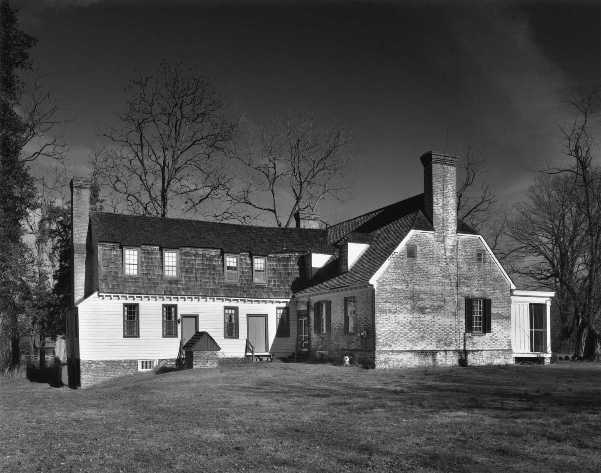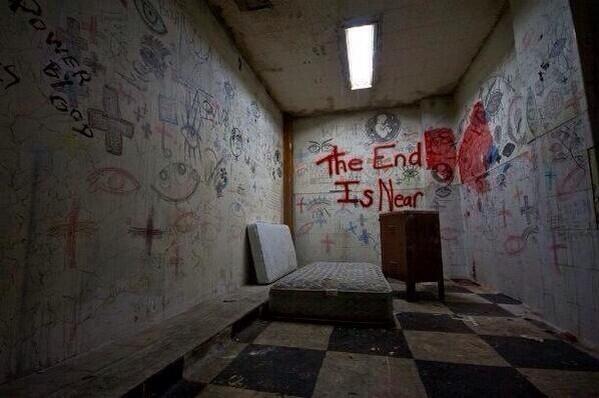Mercy by John Riebow
Synopsis: An abandoned house, a weak old resident and a startled frustrated robber – this is a twsited tale.
About the Author: John Riebow was born and raised in Philadelphia, where he attended the W. B. School High School of Agriculture Sciences, majoring in Horticulture. He holds a Bachelor of Science degree in Landscape Architecture from Temple University, is a LEED-Accredited Professional, and serves as Director of Design for a design-build-development general contractor. His work has been placed in Abandoned Towers, Audience, Ensorcelled, Forge Journal, Loch Raven Review and Ninth Aspect. He has been writing fiction, poetry and radio drama scripts for over twenty years and is currently working on a collection of short fiction.
In this tale of desperation, crime will not pay.
Mercy
by John Riebow
Despite the chilly breeze blowing in the dark moon-less evening, the back of his neck was drenched with sweat, his heart pounding with nervous excitement. He hadn’t felt this way, this alive, since the last hit had coursed through his veins and made him the man he wanted to be. The indescribable sensation made the seconds feel as if they were minutes, the minutes hours as he moved through the world, time like warm water on his skin. He was poised in the shadows like a cat, looking, listening, sniffing at the air with an intense determination.
The house was a stone Cape Cod with a vinyl-clad dormer on the rear that spanned the entire width. There were three windows on the back upper level, two on the lower, one on either gable end and a bay window to the left of the front door, all dark, most with shades drawn low. Both front and rear doors were hidden behind aluminum storm doors, most often squeaky affairs. The garage door was a peeling wooden pair that swung out, like a carriage house, windowless. There were no cars parked in the driveway. The street in the old neighborhood was not like the modern cookie-cutter developments; it was narrow, without sidewalks and dark.
Many of the surrounding yards contained fences or overgrown trees and shrubs. He could move amid the September-flush foliage with little fear of being seen. There were many places to hide. The electric meter spun moderately, typical power draw of a refrigerator and a few clocks; there was no sound from the gas meter. From all indications, the house appeared empty.
Because the house was not far from a rippling creek, the first floor was elevated from the surrounding grade and the lower level windows, even if unlocked, were just out of reach. The doors looked pretty solid. He might try to jimmy the locks but that approach had not been too successful in the past. Just like hotwiring a car; opening a lock with a set of tools in the dark looked easy in the movies and television, but the reality was a completely different matter. He found that the most unobtrusive and least complicated methods of entry were usually the best option.
The window on the upper level to the left was just above a mudroom bump out of some sort and seemed a viable possibility. He stepped carefully up the stairs that led to the back door, got on top of the wooden handrail and, with a minimal groaning effort, was able to pull his hundred and fifty pound frame onto the mudroom roof. The sheathing was a weathered asphalt roll roof that had buckled in the sun and crackled, groaned and flaked in protest when he stepped over it. He lifted his feet higher, moved slower.
The window was now at knee height. The aluminum frame storm window screen was easily punched out of the way and pulled aside. He took the pocketknife from his pants and slid in under the lower sash. As he had hoped, the window was not locked and slid upwards with a squeal of protest. The sound echoed in his mind, loud, surely heard by the entire world. He waited, listened, but the evening remained silent, no one stirred. A passing car returned his thoughts to the moment and he arched one leg over the sill and into the room beyond.
The first thing that stuck him was the smell: dusty, musty, old, the way he remembered his grandmother’s place. Despite her being dead almost twenty years the sudden memory was vivid, as if he had just visited her yesterday. He slipped the rest of his body into the room and found himself on a dark hardwood floor that creaked under his weight. He stood motionless, let his eyes adjust to the deeper blackness and listened.
A sudden wind blew fiercely outside; the gable wall moaned and one of the old windows rattled. But there was nothing else. Silence resumed. He took the keychain light from his pants and shone it around the room. There were floor to ceiling shelves on all four walls, continuous except for window openings, filled with books, all shapes and sizes, laid out in rows, sometimes stacked upon one another, dusty all. He was in a library of some sort. The center of the room held a patterned area rug and a large wooden desk littered with papers. Beyond the wooden desk chair, the room contained a plush black leather couch. If he were into reading books, this might be a cozy little spot, he imagined, if.
The door to the hallway was partway open and he managed to slip through without moving it. The hall was carpeted, his footsteps muffled as he moved. The bathroom was on his right, cluttered, and dry, with no signs of recent use. There was a bedroom on the left and right, he went to the right first and shone his light around. It was a small simple affair; white walls, white ceiling, white carpet, a small bed, nightstand and bureau. The room looked plain, devoid of personality, spare. Thinking the drawers were probably as lacking as the room, he moved onto the next one.
The second bedroom was larger, the floor bare, the walls painted a vibrant green, a double bed in the center of the largest wall. There were pictures; photographs and paintings, the former black and white, the latter color, landscapes, men in suits, ladies in dresses and hats. No one wore clothes like that any more. This room reeked of it again: old. There were two nightstands, one on either side of the bed, each held a lamp topped by a faded flowered shade with gold tassels at the bottom. One contained a book, the other a watch, which he slipped into his pocket. There was a pile of folded clothes on top of the one bureau, a vase with artificial flowers on the other. Having seen the stack above the bureau, the idea of rooting through the drawers did not appeal to him.
Now that he confirmed the bedrooms were empty, he grew more confident no one was home this night. He moved quicker, took less care with his footsteps, made noise. He even considered turning on a light before he went downstairs.
“Don’t get too sloppy,” he whispered to himself and he moved through the hallway, using the flashlight to guide him down the carpeted stairs.
Every step protested his weight and the bottom landing groaned. He shone the light around the living room. Chair, sofa, television, VCR, a nice little clock on the fireplace mantle: now this was more like it. There might be a few things worth a couple of bucks. The candlestick holders on the one bookshelf might even be silver. He slipped the trusty musette bag from his shoulder and began to undo the strap catch when he heard something, or thought he did. A movement? The wind? A mouse? He froze in the middle of the room, switched off the light and waited. Nothing. Stillness. He relaxed a moment. “Don’t be so jumpy,” he told himself, “This was going to be easy.”
He had gotten himself under control and was thinking of the clock when the sound came again, a shuffling, definite movement in the next room. Was someone else in the house or was he just hearing things? Was there a cat or dog? Oh shit, if there was a dog…
His mind raced. Let’s figure this out, he thought. The next room had to be the dining room, then beyond, the kitchen. It wasn’t likely that there was someone in either room, so it was probably just the wind he heard, blowing a curtain maybe. He decided to check the rest of the place out to reassure himself before doing anything else. He moved cautiously toward the next room, through the large archway, and found himself in the dining room. There was not a table where he expected one and he walked into the dangling chandelier, which chimed in the night like tiny bells.
“This is weird,” he thought, catching the hanging globes with a shaking hand. Once the chime died away and he regained himself he heard the unmistakable sound: breathing, heavy, labored, raspy.
He froze; a shiver of fright ran through his entire body, from head to toe. His heart began to race and he felt suddenly light-headed. His eyes scanned the darkness but there was only shadow. He was not alone! The house was not empty! There was someone else there! But where?
The shuffling came again and tore him from his thoughts. His hands were suddenly drenched with sweat. In one brief second he lost control of himself, dropped the musette bag to the floor, the metal clasp rattling.
“What?” came a startled male voice in the darkness, then more shuffling, just ahead. “Who’s there?”
He stayed perfectly still, too afraid to move, too terrified to even breathe. His heart was pounding like a drum, loud in his ears, painful in his chest.
“I know someone else is here in this room.” The voice came again, closer, gaining strength.
What should he do? What could he do? Run? Run for the door? What if you needed a key for the lock, a key that wasn’t there? Dash back upstairs and out the window? Jump from the roof? That seemed like a long way to go. He would be caught surely. How was he going to escape?
“Show yourself, damn you!” the voice demanded. The sound came again, a body shifting on a piece of furniture, a mattress groaning. “What do you want in my house? Have you come to rob me? Kill me?”
The voice was not afraid. There was no terror between the words. This man was a fighter, he could sense that in the dark. What if he attacked? What if he had a gun? Now the would-be thief was really scared. Taking things from an empty house was one thing, having to fight for something was another matter altogether. He had no strength in that moment, didn’t think he could even raise his hands to defend himself when the attack came.
“I’m old. I can’t hurt you. Show yourself.”
He remained still, stunned, unsure what to do next, when the sudden and blinding light hit him like a punch to the stomach. He was winded, gasping for breath.
“Don’t worry, I can barely get up,” the voice explained.
As his eyes adjusted to the lamplight, he saw the figure of an old man huddled on a bed in the corner of the room, a gaunt face and pallid hand the only parts of the small frame visible from under the pile of covers. The man lay there, studying him, and did not move.
After a moment of weighing the scene, he finally got the courage to ask a question. “What’s wrong with you?”
“Lung cancer,” the old man said bluntly, watching him with glassy eyes. “Stage four. I’m dying, not long to go now.”
Now that his terror began to subside, the housebreaker considered the old man. Despite the apparent frailness, there were remnants of strength in the pockmarked face, especially around the eyes. There was something about the way the man furrowed his brow that belied a sort of toughness and he knew that if this encounter had taken place just a few years before the old man would have no-doubt kicked his ass.
“May I?” the man asked, indicating to a metal flask on the bedside table.
“What’s that?”
“Liquid morphine. The only thing that works anymore.”
The housebreaker nodded and watched the old man drink from the flask with a visible sign of relief. The poor bastard must be in a lot of pain, he thought.
“You must be really desperate to be here like this. What sort of pain are you in?” the old man asked, as if reading his thoughts.
A sudden anger began to swell in him now that his plans were foiled. He didn’t need stay here listening to this old fool. He needed to get out, get away.
“It’s ok. Calm down,” the man said with a weak wave of his little hand. “I’m old. I won’t put up a fight. I won’t remember what you look like. You must really need something I have. Are you on drugs?”
The housebreaker looked away, as ashamed as if his own grandfather had broached the question. It wasn’t simply about drugs, but trying to regain that feeling that meant he was alive.
“There’s a safe upstairs,” the old man began. “There’s money inside. I’ll give you the combination.”
Was he hearing things right? What was this old fool saying? “Why would you do that?”
“Because I need you. I’ll give you the combination if you do me a favor.”
“I’m not here to bargain,” the housebreaker retorted, growing more confident and angry. “You’re here alone, defenseless. You will tell me.”
“I will not!” the old man roared with a sudden and terrifying strength that cowed the thief. “I will not tell you a thing until you promise to do me a favor.”
His mind reeled. The whole situation was ridiculous. He either needed to get the hell out of there or knock the old guy on the head and take a few things he could sell for the next hit, not stand here making small talk with his would-be victim.
“What can I do for you?” he asked with a bitter sarcasm. “Turn myself in? Put my life of crime behind me? Stop taking drugs?”
“I don’t really care what happens to you the moment you step out that door, but I want you to do something first.”
“What? What do you want?”
“I don’t know what sort of a man you are,” the old man wondered with a probing tilt of head. “I can guess, but I don’t know, not really.”
“Come out with it already.”
There was a pause as the old man straightened himself in the bed. He looked to the thief, ready to gauge his response. “I want you to kill me.” He declared.
“What?”
“You heard. I want you to kill me.”
“You’re crazy!” He didn’t have time for this. He should just get the hell out of there.
“No, I’m not crazy,” the old man said with a melancholy chuckle. “I’m dying, but slowly, too slowly and too painfully. I want it to be over. Now. I want you to end it.”
“No.” the housebreaker said, his whole body shaking in negation. He was not a killer. He could never. He wasn’t that sort of man.
“Come on. It will be easy.” the old man managed between a sudden bout of coughing.
“No.”
“What are you, some sort of coward?”
If truth were told, he was a coward. He was a coward who took always took the easy way. He had resigned himself to this reality sometime ago. School had been too much work, so he took the easy way and dropped out. Getting a job was too hard, so he took the easy way and stole. Even thieving was too much effort sometimes. He was inherently lazy, inherently a coward and was not sure if this had turned him to drugs, or the drugs had made him the way he was. It didn’t matter much any more; he was too lazy to ponder such things for long.
“Look, my wife and best friends are dead, my children grown and far away. I’m alone. I have no one. My youth, my career, the glories and tests I saw in the war are all behind. I am no longer the man I was; I can’t live life the way it needs to be lived, so it’s time to get out of the way and make room for the next guy. I don’t have any guns in the house or I’d do a Hemingway, so I’m asking my fellow man for a helping hand.”
The old man was a sad figure for sure, but he could no sooner kill him than run down a dog with a car, but the money was tempting. How much was there, he wondered.
“All right. I’ve thought about it. Give me the combination and I’ll do it.”
A sudden joy came to the old man’s face. “Really?”
“Really.”
“Promise?”
“Promise,” the housebreaker assured with an affirming nod. “Now give me the combination.”
A deal was struck. The old man told him to go up to the back bedroom, where he would find a safe in the closet near the old black and white picture of the New York skyline. “It’s in the back, you’ll have to pull it out.”
The thief vaulted the stairs, thinking with delight how easy this was going to be. He would open the safe, take the money and go out through the window by which he entered. He would be long gone before the old man figured out that he’d been tricked and wouldn’t have to kill anyone.
The safe was right where the old man had said, a big mass of pale green steel. Like the house and its inhabitant, the thing was old. He struggled to pull the heavy safe out of the closet and into the light from the bedside lamp. The door had a large black dial with white numbers. The old man said to go from right to left and back to right. He spun the dial: 36, 19, 38 and waited for the click, but nothing happened. Maybe he did something wrong. He spun the dial twice to the left to clear it and settled on the first number, then the second and third. Nothing. Maybe he misheard the man and should start left, then go right and back to left. He cleared the dial and began with the left, with no result. He tried again, several times in each pattern, but the door remained fastened.
“It’s not working. I can’t get it open.” He called down the stairs. Had he heard wrong, or had the old fool been messing with him? The thought of being so close to the money drove him downstairs.
“What am I doing wrong?” he asked, but there came no answer.
He found the old man in bed, hollow eyes looking to the ceiling, metal flask inches from his bony hand, visibly dead. His face looked oddly happy. Did he know relief in the end? But it was not the sight or smell of death that caused the housebreaker’s face to suddenly blanch; it was the open cell phone on the sheet that shook him. He made for the door, threw open the latch and ran straight into the arms of a police officer, a second by his side, gun drawn.
The rest of the night was a blur, as the adrenalin rush began to subside and his body started to experience the painful withdrawal symptoms of his dependency. He raged and roared and threw himself around the cell, cursing the old man with each new searing shot of agony.
**** THE END ****
Copyright John Riebow 2012
Image Courtesy: The Virginia Department of Historic Resources




